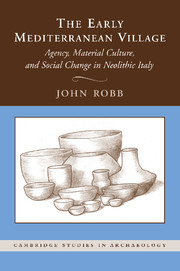Book contents
- Frontmatter
- Contents
- List of Figures
- List of Tables
- Preface
- ONE THEORIZING NEOLITHIC ITALY
- TWO NEOLITHIC PEOPLE
- THREE THE INHABITED WORLD
- FOUR DAILY ECONOMY AND SOCIAL REPRODUCTION
- FIVE MATERIAL CULTURE AND PROJECTS OF THE SELF
- SIX NEOLITHIC ECONOMY AS SOCIAL REPRODUCTION
- SEVEN NEOLITHIC ITALY AS AN ETHNOGRAPHIC LANDSCAPE
- EIGHT THE GREAT SIMPLIFICATION: LARGE-SCALE CHANGE AT THE END OF THE NEOLITHIC
- Notes
- Bibliography
- Index
EIGHT - THE GREAT SIMPLIFICATION: LARGE-SCALE CHANGE AT THE END OF THE NEOLITHIC
Published online by Cambridge University Press: 28 July 2009
- Frontmatter
- Contents
- List of Figures
- List of Tables
- Preface
- ONE THEORIZING NEOLITHIC ITALY
- TWO NEOLITHIC PEOPLE
- THREE THE INHABITED WORLD
- FOUR DAILY ECONOMY AND SOCIAL REPRODUCTION
- FIVE MATERIAL CULTURE AND PROJECTS OF THE SELF
- SIX NEOLITHIC ECONOMY AS SOCIAL REPRODUCTION
- SEVEN NEOLITHIC ITALY AS AN ETHNOGRAPHIC LANDSCAPE
- EIGHT THE GREAT SIMPLIFICATION: LARGE-SCALE CHANGE AT THE END OF THE NEOLITHIC
- Notes
- Bibliography
- Index
Summary
There was no agreement among the scholars of Chelm on how the town came into existence. The pious believed that God said, “Let there be Chelm.” And there was Chelm. But many scholars insisted that the town happened as the result of an eruption.
Isaac Bashevis Singer, The Fools of Chelm and Their History. (Singer 1973, p. 3)If we want things to stay as they are, things will have to change. Do you understand?
Giuseppe di Lampedusa, The Leopard (1960, p. 40).The Leopard is a story of change – of the passing of a faded feudal aristocracy swept away by the unification of Italy in 1860. Di Lampedusa's words above are spoken by a young Sicilian aristocrat who rides the storm to take away his ancestral estates and privileges by joining Garibaldi's militia and marrying into the up-and-coming bourgeoisie. His words underline the paradox of explaining social change in human terms.
Explanations of change are always teleological and retrospective; as in I. B. Singer's mythical village of Chelm, origin stories are closely tied to the identity and nature of the phenomenon. They are defined by the problem to be solved, the change to be accomplished. “Origins” research, thus, is inherently suspect due to its ability to provide a powerful tool in objectifying and legitimating the present (Conkey and Williams 1991; Gathercole and Lowenthal 1990).
- Type
- Chapter
- Information
- The Early Mediterranean VillageAgency, Material Culture, and Social Change in Neolithic Italy, pp. 286 - 342Publisher: Cambridge University PressPrint publication year: 2007



